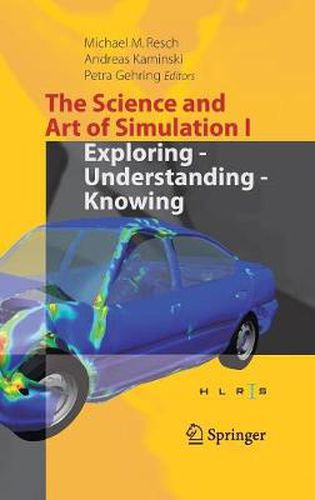Readings Newsletter
Become a Readings Member to make your shopping experience even easier.
Sign in or sign up for free!
You’re not far away from qualifying for FREE standard shipping within Australia
You’ve qualified for FREE standard shipping within Australia
The cart is loading…






This title is printed to order. This book may have been self-published. If so, we cannot guarantee the quality of the content. In the main most books will have gone through the editing process however some may not. We therefore suggest that you be aware of this before ordering this book. If in doubt check either the author or publisher’s details as we are unable to accept any returns unless they are faulty. Please contact us if you have any questions.
The new book series The Science and Art of Simulation (SAS) addresses computer simulations as a scientific activity and engineering artistry (in the sense of a techne). The first volume is devoted to three topics:
The Art of Exploring Computer Simulations
Philosophy began devoting attention to computer simulations at a relatively early stage. Since then, the unquestioned point of view has been that computer simulation is a new scientific method; the philosophy of simulation is therefore part of the philosophy of science. The first section of this volume discusses this implicit, unchallenged assumption by addressing, from different perspectives, the question of how to explore (and how not to explore) research on computer simulations. Scientists discuss what is still lacking or considered problematic, while philosophers draft new directions for research, and both examine the art of exploring computer simulations.
The Art of Understanding Computer Simulations
The results of computer simulations are integrated into both political and social decisions. It is implicitly assumed that the more detailed, and consequently more realistic, a computer simulation is, the more useful it will be in decision-making. However, this idea is by no means justified. Different types of computer simulations have to be differentiated, which in turn requires the specific skill of understanding computer simulation results. The articles in this section examine the capabilities and limits of simulation results in political and social contexts, exploring the art of understanding computer simulation results.
The Art of Knowing through Computer Simulations?
The advent of computer simulation in today’s scientific practices challenges the order of science. What kind of knowledge is gained through computer simulations is the key question in this section. Computer simulations are often compared to experiments or to arguments, and the transformation of our traditional scientific notions might be more challenging than expected - these Ideas are put forward in the third section to conceptualize the art of knowing through computer simulations.
$9.00 standard shipping within Australia
FREE standard shipping within Australia for orders over $100.00
Express & International shipping calculated at checkout
This title is printed to order. This book may have been self-published. If so, we cannot guarantee the quality of the content. In the main most books will have gone through the editing process however some may not. We therefore suggest that you be aware of this before ordering this book. If in doubt check either the author or publisher’s details as we are unable to accept any returns unless they are faulty. Please contact us if you have any questions.
The new book series The Science and Art of Simulation (SAS) addresses computer simulations as a scientific activity and engineering artistry (in the sense of a techne). The first volume is devoted to three topics:
The Art of Exploring Computer Simulations
Philosophy began devoting attention to computer simulations at a relatively early stage. Since then, the unquestioned point of view has been that computer simulation is a new scientific method; the philosophy of simulation is therefore part of the philosophy of science. The first section of this volume discusses this implicit, unchallenged assumption by addressing, from different perspectives, the question of how to explore (and how not to explore) research on computer simulations. Scientists discuss what is still lacking or considered problematic, while philosophers draft new directions for research, and both examine the art of exploring computer simulations.
The Art of Understanding Computer Simulations
The results of computer simulations are integrated into both political and social decisions. It is implicitly assumed that the more detailed, and consequently more realistic, a computer simulation is, the more useful it will be in decision-making. However, this idea is by no means justified. Different types of computer simulations have to be differentiated, which in turn requires the specific skill of understanding computer simulation results. The articles in this section examine the capabilities and limits of simulation results in political and social contexts, exploring the art of understanding computer simulation results.
The Art of Knowing through Computer Simulations?
The advent of computer simulation in today’s scientific practices challenges the order of science. What kind of knowledge is gained through computer simulations is the key question in this section. Computer simulations are often compared to experiments or to arguments, and the transformation of our traditional scientific notions might be more challenging than expected - these Ideas are put forward in the third section to conceptualize the art of knowing through computer simulations.